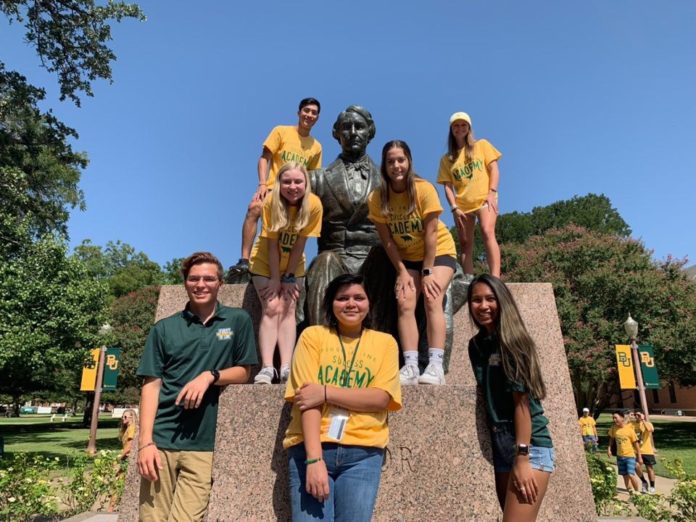By Tyler Bui | Staff Writer
Baylor’s First in Line program provides support and guidance to first-generation college students while they adjust to a new environment, prepping them for their future endeavors.
The program includes a range of different events, resources and organizations that help first-generation students of all ages and backgrounds as they make their way through their undergraduate career at Baylor.
Michelle Cohenour, director of Student Success Initiatives and interim program manager for the First in Line program, said the program was created to support first-generation students who often do not have family members who have previously navigated the college landscape.
“We define ‘first-generation’ very broadly at Baylor and we do that intentionally so that we can serve more students in the program,” Cohenour said. “The hope and mission for the program is to make sure that our first-generation students have support, resources, connections and opportunities at Baylor so that they can fully thrive and have a meaningful experience.”
Within the First in Line program, the First in Line Success Academy (FILSA) is an incentive program that provides students with scholarships and support from peers and mentors. This year, there are 65 students enrolled in FILSA.
“FILSA is a pre-fall semester experience for students. It begins three days before Welcome Week and extends throughout their first year,” Cohenour said. “In the students’ first year, we hold dinners on the first Monday of each month and have specialized workshops. The students have one–on-one weekly meetings with their graduate student mentor. They also meet monthly with their peer mentors, who are first-generation students themselves.”
Upland, Calif., freshman Haley Peterson is a part of FILSA and participated in the orientation program prior to Welcome Week.
“During those few days before Welcome Week, we had orientation with the leaders and counselors who are a part of FILSA,” Peterson said. “We participated in academic workshops, did team bonding activities and community service. In the academic workshops, we learned how to read a syllabus, how to contact a professor, tips on note taking and information on office hours.”
Peterson said it was helpful to move in early and become familiar with Baylor before classes started.
“My favorite aspect of the First in Line Program is how they give first-generation students support and guidance, especially with resources that we wouldn’t know how to access or how to use,” Peterson said. “Even just meeting people those few days before Welcome Week made such a big difference. It was really awesome to connect with other first-generation students who were experiencing the same thing I was.”
Other resources within the First in Line Program include the First in Line Student Society, a strategic learning course and the Peer Leader Program.
“The Student Society is a student organization founded in 2017. It is largely a social organization for our students, but they also hold events and special programming to help prepare students for the future,” Cohenour said. “It’s mostly a social and networking opportunity for first-generation students. We also have an STL course called ‘First Generation in College’ with 20 students enrolled this semester. It’s a wonderful opportunity to provide a really supportive classroom environment where students can ask questions.”
The Peer Leader Program connects the First in Line freshmen students with other peers who are first-generation as well.
“First in Line Peer Leaders will assist first-year, first-generation college students during their transition to Baylor. Peer Leaders will have the unique opportunity to positively impact first-year students’ college experience,” the website states.
The First in Line program is based around three major components that encompass their mission.
“First is the strong academic start. Second is a sense of belonging and connection,” Cohenour said. “The third component is the overall college life experience which includes understanding finance in college and knowing when to ask for help. We try to reiterate to our First in Line students that asking for help and guidance is not weakness, but rather something positive.”
Cohenour said there were two specific aspects she enjoys most about the program.
“One is the recognition that being first-generation is so important. I think that is something we try to celebrate in every interaction—that these students are chartering a new and exciting life for themselves and their future family,” Cohenour said. “The second thing I am most excited about is just the robust support system we have–we use the term ‘investing in our students’ often, and we have so any people who are ready and willing to invest in them.”
Peterson and Cohenour share a similar perspective on the significance of being first-generation.
“Being a first-generation student means so much; not only to me but my family as well,” Peterson said. “I have a sense of pride being a first-generation student and want to make my family proud of what I accomplish here at Baylor.”
To learn more about Baylor’s First in Line program, visit the Baylor website.






